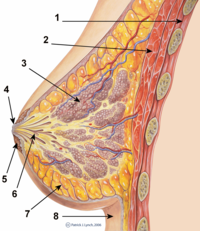
Photo from wikipedia
Leukocyte infiltration plays an active role in controlling tumor development. In the early stages of carcinogenesis, T cells counteract tumor growth. However, in advanced stages, cancer cells and infiltrating stromal… Click to show full abstract
Leukocyte infiltration plays an active role in controlling tumor development. In the early stages of carcinogenesis, T cells counteract tumor growth. However, in advanced stages, cancer cells and infiltrating stromal components interfere with the immune control and instruct immune cells to support, rather than counteract, tumor malignancy, via cell–cell contact or soluble mediators. In particular, metabolites are emerging as active players in driving immunosuppression. Here we demonstrate that in a prostate cancer model lactate released by glycolytic cancer-associated fibroblasts (CAFs) acts on CD4+ T cells, shaping T-cell polarization. In particular, CAFs exposure (i) reduces the percentage of the antitumoral Th1 subset, inducing a lactate-dependent, SIRT1-mediated deacetylation/degradation of T-bet transcription factor; (ii) increases Treg cells, driving naive T cells polarization, through a lactate-based NF-kB activation and FoxP3 expression. In turn, this metabolic-based CAF-immunomodulated environment exerts a pro-invasive effect on prostate cancer cells, by activating a previously unexplored miR21/TLR8 axis that sustains cancer malignancy.
Journal Title: Oncogene
Year Published: 2019
Link to full text (if available)
Share on Social Media: Sign Up to like & get
recommendations!